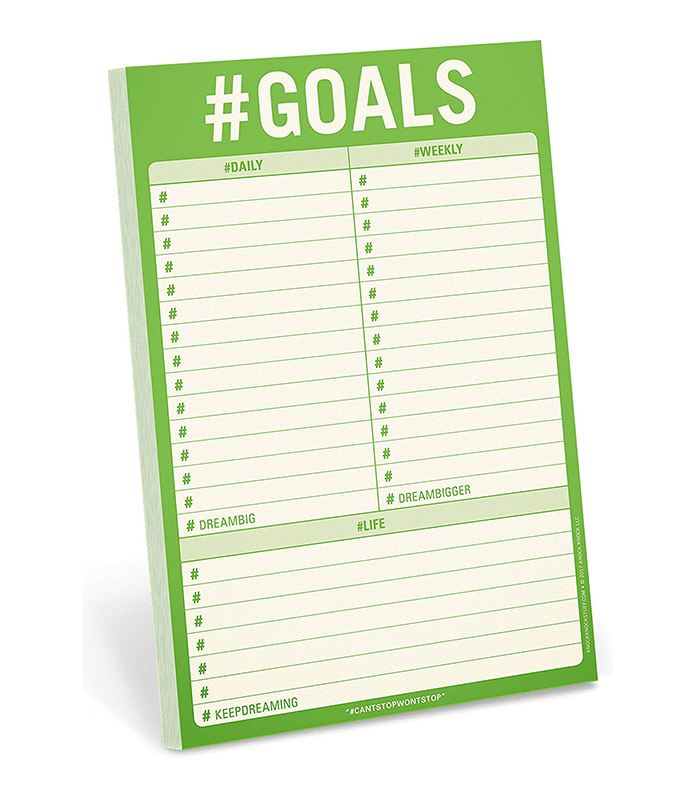14 Ways You Can Stand Up for Yourself, Even When It's Hard

It can be so hard to speak up or stand up for yourself. And when you're a woman, it can be even harder. You probably already know this. We can blame this inability or difficulty on a number of things. It could be how you were raised, what society has told you, previous life experiences, your own perception of yourself, etc. I'm leaving the why intentionally vague because everyone has different experiences and reasons for not being able to be more assertive.
I don't think I'm alone in saying I've struggled with it my whole life. For me, I know deep down that I'm smart, capable, strong, friendly, charming… all that good stuff. But sometimes, when it's game time and I have the opportunity to show what I really can do, I choke. Something takes ahold of me, and I can't say or do anything without second-guessing myself or hearing the little voice in my head that says, "You can't," or "Are you sure about that?"

I've heard from so many wise women, like my mom, bosses, friends' moms, mentors, etc., that you get more confident and don't seem to care as much about what other people think when you get older. Just the fact of going through life and experiencing so much can leave you feeling more capable. It makes sense. If you've been through a lot and made it to the other side, you know how strong you are.
I keep waiting for that day when I can have the ultimate confidence and attitude. Now that I'm in my 30s, I do feel more sure of myself, but I still find it hard to be more assertive and strong in certain situations. I'm realizing, though, that there isn't going to be a magical day when I turn 40 or 50 or 60 and suddenly everything clicks and that little voice in my head will say goodbye forever. I do understand that more confidence will come in time, but I can't passively wait for it. I've got to take action, and I've got to put some methods for assertiveness into practice. It's not going to happen overnight, and it's definitely not going to happen without trying.

So to be more proactive with my assertiveness (or lack thereof), I reached out to two experts for some actionable tips and suggestions on standing and speaking up for yourself. Take a look at what they had to say below.
Work on Your Internal Narrative

This is a big part of feeling confident and strong in different types of situations, says Madeleine DiLeonardo, MEd, LPC, NCC, a licensed professional counselor and the founder of Mind Body and Soul by DiLeonardo Wellness.
"When we are nervous or intimidated, we tend to engage with a negative internal dialogue about our ability to deal with difficult situations," she says. "We want to try to notice times where we are not feeling as confident or when situations are triggering to us and try to work through them in order to handle these instances more effectively in the future. Try for a few weeks to keep track of times when you are feeling confident, as well as the times when you are feeling insecure and less sure of yourself. Then, try to spend some time recognizing what feelings the challenging situations bring up in you in order to plan for ways to better handle them."
Reframe Your Thoughts

Part of changing your internal narrative is reframing your thoughts. DiLeonardo encourages her clients to use a mantra from one of her favorite authors, Glennon Doyle, that is essentially, "I can do hard things."
Sure, times get tough, but when you reframe your thoughts about the situation, it can help you feel more capable. "Rather than fearing when things get challenging at home or at work, or letting anxiety about potential upcoming challenges take over, we want to acknowledge that challenges are part of life and instead remind ourselves that we can handle this," she says.
Take Your Time

Psychotherapist Katherine Schafler, LMHC, sums it up simply: Don't confuse impulsivity with confidence. It's okay to take a step back to process things and think of what to do, especially when you're confronted with a difficult situation
"In a way, we're all conditioned to think that confidence means knowing what to do in the exact moment that you need to do it," Schafler explains. "When that happens, it's great, but keep in mind that typically there's a period of time between an event and your understanding of what the event means to you, known as 'processing.' For example, if someone is sharing a joke at a dinner that insults you in some way, you may not appreciate how offensive it actually was until you're in the car home and you have a moment to think about it."
Control Your Response

When asked what to do about controlling emotions in tough situations, Schafler says your response is important, not your reaction, which makes sense with what she said above about taking your time.
"Different contexts allow for different parts of yourself to show. Ideally, with a partner, you're able to be more vulnerable than you might be with a colleague, for example," she explains. "You don't need to worry about controlling your reaction. We feel what we feel. The key is instead to control your response (what you consciously do about how you feel). If you're constantly in a reactive place, you are giving your power away. Your entire emotional state and all your behaviors become completely dependent on what someone else does or doesn't do. Reactivity isn't empowering; consciously responding is."
Keep Track of Small Wins

This will give you a confidence boost when you need it the most. "When we are struggling to feel confident, we often engage in 'catastrophic thinking,' which is essentially thinking the worst-case scenario about yourself or the situation," DiLeonardo explains. "Being able to refer to small wins and previous successes during difficult times can aid in more realistic thinking about yourself and your abilities."
Create a Script

Not everything should be scripted, but it's helpful to have some phrases to practice and have up your sleeve. "I'm a big fan of quick scripts, which are lines you can say that you don't really have to think too hard about," Schafler says. "For example, 'I'm not sure what you mean by that,' is a great way to ask for more clarity when someone has made an ambiguous comment that confuses, offends, or otherwise disorients you. Another great script is, 'I have a policy about always sleeping on big decisions,' to use when you feel put on the spot and asked to commit to or do something you don't know how to decline."
But don't rehearse too much. "You don't want to get too wrapped up in rehearsing that you are focused on trying to articulate what you've practiced verbatim, but being prepared allows us to feel more confident and comfortable when handling a challenging or awkward situation," DiLeonardo adds.
Don't Get Too Stuck on Others' Reactions

We can't plan what we're trying to say or avoid saying something because we're worried about what that other person will say. Yes, we should be respectful, but don't hold back on saying something you truly care about because you're scared of the response.
"If you are confident in what you're saying, the other person's reaction actually does not need to be the main focus," DiLeonardo says. "I think often we get wrapped up in how other people are feeling and how they react, but we are all responsible for our own behaviors and decisions, and how other people feel and therefore respond and behave is their responsibility and not for you to take on as your own."
Think About Whether a Certain Situation Is Avoidable

Some tough and challenging situations aren't avoidable, but for some, you can choose to put yourself in them or not. If it's the latter, Schafler recommends asking why you're putting yourself in a situation you know will be weird. "If you can decline to engage, you should feel license to do so," she says. "That said, I get that there are some moments which simply can't be avoided. In those cases, yes, a script or a few one-liners can work wonders. Definitely prepare but don't go overboard. Also, remember you can always excuse yourself and take a break—go to the bathroom! If you're stressed and need a little pep talk, take a moment to collect your thoughts and reset your energy."
Pay Attention to Words

A lot of us are used to uttering the words, "Sorry," or "It's okay," or "Apologies," when we don't 100% mean it to avoid confrontation. It's hard to train yourself not to say those words. They can be reflexes, but DiLeonardo suggests taking some time to think before you speak. "Before you do this, ask yourself if it is necessary to add an apology to what you are saying and instead try to utilize stronger language," she recommends. "Try saying things like 'Excuse me' instead of 'Sorry,' or something like, 'Please let me know when you have time to (insert task here)' instead of 'So sorry to bother you.'"
Think About What Makes You Feel Confident

Continuing to do the things that make you feel good will help you live your life with more strength. "For some women, it is dressing the part and feeling confident in their professional attire," DiLeonardo says. "For others, it is getting a good workout in the morning before work. Whatever contributes to you feeling like the best version of yourself will aid in standing in your power and having confidence in yourself and your abilities."
Develop Trusted Relationships

Relationships are important, and when it comes to feeling strong and empowered, knowing you have a good support system can really help. Having people you trust around you can help you practice speaking and standing up. This is especially true in society when some women can be perceived as "bossy," "bitchy," "problematic," etc., when they're being more assertive. "While we are continuing to fight this stigma, developing relationships where you feel you can fully express yourself and be supported are helpful," DiLeonardo says. "This may be in the form of a trusted co-worker, a mentor outside of work, or a group of supportive girlfriends. If possible, having support around you that does not contribute to this negative trope but instead lifts you up is great."
Learn to Deal With Negativity

The truth is there's always going to be someone who tries to bring you down with negativity. Coming to terms with that is key. "You can't fully be yourself in the world without someone having something negative to say," Schafler. "The thing to remember is even if you're fake and trying to please everyone, people will still say all the negative things, so you might as well just be yourself. The way others react to people who are in touch with their power says everything about their own sense of entitlement/ability to be in touch with their own power and has nothing to do with you."
Unlearn Toxic Beliefs

You have probably been brought down by people or someone has told you something about yourself that makes you question a lot of things. DiLeonardo says that part of the work we need to do is to unlearn what we've been told by people or society about behaving as ourselves. No, this doesn't mean we have to say goodbye to human decency or respect, but we're talking about the things that hit our confidence and make us hide who we truly are.
"I have been told by an ex-boyfriend that I love the people around me more than they love me; have been told by mean girls that I am too loud or too much; have been told by naysayers that I should just work for someone else rather than open up my own practice," DiLeonardo says. "What I've learned and what I try to teach my clients is the part of me that some people viewed as 'too much' is actually my greatest strength. It's my superpower. My ability to love my people so much has allowed me to cultivate amazing relationships in my life. My passion and work ethic has allowed me to create a job for myself that I enjoy and challenges me every day. My love of life and positivity allows me to maintain a healthy mindset to the best of my ability. And the people I am 'too much' for are simply not my people. I now refuse to make myself smaller just to please or placate others."
DiLeonardo explains that she utilizes this example when she works with clients about embracing their true selves and finding ways to use those strengths for success.
Know What You Want and Ask for It

You've probably heard this a lot, but it's never been truer. "I'm often shocked at how many people will ask for coffee, for example, when what they really want is an email introduction to someone that the other person knows," Schafler says. "Be direct—not asking for something is one of the best ways to not get it."
Next up: How to Say No Without the Guilt, According to a Therapist and Etiquette Coach
This article is provided for informational purposes only and is not intended to be used in the place of advice of your physician or other medical professionals. You should always consult with your doctor or healthcare provider first with any health-related questions.
Sarah is lifestyle writer and editor with over 10 years of experience covering health and wellness, interior design, food, beauty, and tech. Born and raised in Los Angeles, she attended New York University and lived in New York for 12 years before returning to L.A. in 2019. In addition to her work at Who What Wear, she held editor roles at Apartment Therapy, Real Simple, House Beautiful, Elle Decor, and The Bump (sister site of The Knot). She has a passion for health and wellness, but she especially loves writing about mental health. Her self-care routine consists of five things: a good workout, “me” time on the regular, an intriguing book/podcast/playlist to unwind after a long day, naps, and decorating her home.


